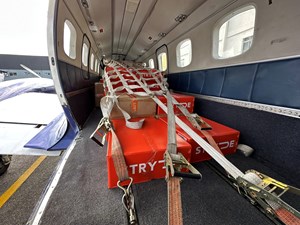STRYDE deploys over 26,000 seismic nodes in Brazil for onshore CCS exploration projects
(WO) – STRYDE has supplied geoscience and technology pioneer, Explor, with 26,370 STRYDE Nodes to enable a series of carbon capture and storage (CCS) projects to support carbon-negative bioenergy in Brazil.

The projects mark the first time that STRYDE has seen its seismic sensor technology used in Brazil.
The CCS projects were commissioned by bioenergy companies specializing in ethanol production from agricultural sources. The primary objective is to identify suitable geological formations for carbon storage. By sequestering carbon emissions resulting from the fermentation process deep underground, proponents aim to make the resulting bioenergy production carbon negative.
The series of surveys includes two separate projects in Brazil, whereby Explor is conducting two 3D surveys totaling over 100 km2, near existing bioenergy facilities.
During the surveys, Explor will acquire high-resolution seismic data using STRYDE’s Nodes, to help their client understand the suitability of the subsurface for permanent geological storage of CO2 and to identify optimal well locations.
Mike Popham, CEO at STRYDE explained, “We are excited to see Explor delivering STRYDE’s first full-scale projects in Latin America. Until recently, seismic data was seen as an exclusive product of the oil and gas industry, due to the significant CAPEX and OPEX costs associated with acquiring the data.
“However, our unique, market-leading low-cost nodal sensor enables the rapid acquisition of high-resolution seismic data that multiple industries need to explore for new energy sources, to decarbonize, and to de-risk projects.
“Due to the node size, it requires smaller crews, fewer logistics, and less heavy vehicles which allows further cost savings and efficiency gains, whilst drastically reducing land disruption and environmental footprint on a seismic survey – making seismic data affordable for emerging industries like onshore CCS.”
The surveys will combine ISSN source methodology with Explor’s IntelliSeis acquisition management system. Explor’s proprietary Pinpoint source technology will be combined with STRYDE Nodes to deliver high-density seismic data with near-zero environmental footprint.
Rapid air-freight delivery of the nodes into Brazil allowed Explor to deliver the largest seismic nodal project to date in Brazil, representing a sign of the scale of the projects that STRYDE and Explor can rapidly enable in the region.
Allan Châtenay, President at Explor added, “The setup of a new entity in Brazil, employment of a local team, and the use of STRYDE enables us to deliver much higher trace densities within the budgets established by our clients. Perhaps most importantly for Brazil, the extremely light and compact design of the STRYDE Node supports our near-zero-environmental footprint operations – a critical aspect of working in Brazil. Together with our low-environmental impact PinPoint seismic source, we can deliver high-density 3D seismic data with a near-zero footprint. We’ve even moved significant numbers of nodes by air freight between projects, allowing us to optimize efficiency for our end client.”


